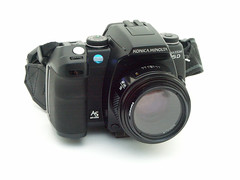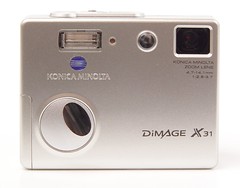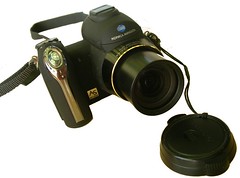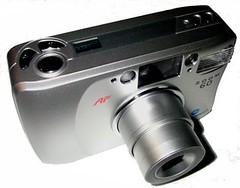Difference between revisions of "Konica Minolta"
(changed all camera sidebar photos to cw pool converted to default img temps.) |
m (→Dynax/Maxxum/alpha) |
||
| Line 21: | Line 21: | ||
The Dynax cameras are the line of cameras that use these lenses. | The Dynax cameras are the line of cameras that use these lenses. | ||
| − | * Minolta Dynax 7 / Maxxum 7 / | + | * [[Minolta Dynax 7|Minolta Dynax 7 / Maxxum 7 / α-7 (alpha 7)]] - A reworked [[Minolta#Minolta_Autofocus_35mm_SLR|Minolta AF-SLR]] camera for 35mm film that uses the Dynax lenses |
* [[Konica Minolta Dynax 5D|Konica Minolta Dynax 5D / Maxxum 5D / alpha Sweet DIGITAL]] - A similar SLR camera for Dynax lenses with plastic body | * [[Konica Minolta Dynax 5D|Konica Minolta Dynax 5D / Maxxum 5D / alpha Sweet DIGITAL]] - A similar SLR camera for Dynax lenses with plastic body | ||
* [[Konica Minolta Dynax 7D|Konica Minolta Dynax 7D / Maxxum 7D / alpha-7 DIGITAL]] - A digital SLR camera that uses the Dynax lenses | * [[Konica Minolta Dynax 7D|Konica Minolta Dynax 7D / Maxxum 7D / alpha-7 DIGITAL]] - A digital SLR camera that uses the Dynax lenses | ||
Revision as of 01:06, 4 January 2012
Konica Minolta was created by the merger of Konica and Minolta in 2003; the subsequent models were branded "Konica Minolta".
One of the best new products of the company was the award-winning[1] film scanner Scan Elite 5400 II. Another success was the production of zoom lens units for small cameras and lens units for the microcamera modules of mobile phones.
Konica Minolta announced in January 2006 that it would stop all its activities related to photography, such as camera design and production, analog or digital, as well as the development and production of film and photo paper[2] It transferred "certain assets" (especially its know-how about making autofocus SLRs, AF lenses and DSLRs) to Sony[3], which has developed DSLRs compatible with the Konica Minolta AF system (Dynax/Maxxum/Alpha/Alpha Sweet).
Contents
Cameras
For cameras made before the companies merged, see Konica and Minolta. The very first new models from after the merger got the Minolta badge, too, and are listed below. Since Konica Minolta did not last long as a camera maker, all its products (new and reworked ones) are listed. The company still offers zoom lens modules for compact cameras of other makers.

|
| Konica Minolta Maxxum 5D image by Steve Harwood (Image rights) |
Dynax/Maxxum/alpha
The Dynax/Maxxum/alpha (Maxxum in North America, alpha in Japan, Dynax elsewhere) lenses are Minolta's 35mm autofocus SLR lenses.
The Dynax cameras are the line of cameras that use these lenses.
- Minolta Dynax 7 / Maxxum 7 / α-7 (alpha 7) - A reworked Minolta AF-SLR camera for 35mm film that uses the Dynax lenses
- Konica Minolta Dynax 5D / Maxxum 5D / alpha Sweet DIGITAL - A similar SLR camera for Dynax lenses with plastic body
- Konica Minolta Dynax 7D / Maxxum 7D / alpha-7 DIGITAL - A digital SLR camera that uses the Dynax lenses
Dynax/Maxxum/alpha lenses for the digital SLRs
- 1:3,5-1:6,3/18-200mm
- 1:3,5-1:5,6/18-70mm
- 1:4,5-1:6,3/11-18mm
DiMAGE

|
| Konica Minolta DiMAGE X31 image by Martin Taylor (Image rights) |
Konica Minolta maintained the Dimage name that Minolta had used for digital cameras.
- X-Series: pocket, interior mirrored zoom lens (Minolta origin):
- Minolta DiMAGE X21
- Minolta DiMAGE X31
- Konica Minolta DiMAGE X50
- Konica Minolta DiMAGE X60
- Konica Minolta DiMAGE Xg
- Konica Minolta DiMAGE X1
- A-Series: TTL EVF integral super-zoom lens, RAW/TIF/JPG, anti-shake for sensor (Minolta origin):
- Konica Minolta DiMAGE A1, 5mp
- Konica Minolta DiMAGE A2, 8mp
- Konica Minolta DiMAGE A200, 8mp

|
| Konica Minolta Z6 image by Uwe Kulick (Image rights) |
- Z-Series: TTL EVF ZLR PASM JPG, integral super-zoom lens (Minolta origin):
- Konica Minolta DiMAGE Z1 - 10x zoom, 3.2mp
- Konica Minolta DiMAGE Z10 - 8x zoom, 3.2mp, no accessory flash
- Konica Minolta DiMAGE Z2 - 10x zoom, 4mp, GT APO Lens
- Konica Minolta DiMAGE Z3 - 12x zoom, 4mp, GT APO Lens, Anti-Shake
- Konica Minolta DiMAGE Z5 - 12x zoom, 5mp, GT APO Lens, Anti-Shake
- Konica Minolta DiMAGE Z20 - 8x zoom, 5mp, no accessory flash
- Konica Minolta DiMAGE Z6 - 12x zoom, 6mp, GT APO Lens, Anti-Shake
- G-series: compact digital zoom (Konica origin):
- MINOLTA DiMAGE G400
- MINOLTA DiMAGE G500
- Konica Minolta DiMAGE G530
- Konica Minolta DiMAGE G600
- Accessing raw output on G series
- DG-Series
- Konica Minolta DG-5W
- Konica Minolta DG-4W
- Konica Minolta DG-3Z
- Konica Minolta DG-2
- E-Series (made by Premier)
- Konica Minolta DiMAGE E40
- Konica Minolta DiMAGE E50

|
| Konica Minolta Zoom 60 image by Uwe Kulick (Image rights) |
compact cameras
Konica Minolta reworked two of the older Minolta Riva/Freedom zoom models for 35 mm film
- Konica Minolta zoom 130c DATE
- Konica Minolta zoom 160c DATE
Lenses
Konica Minolta continues to produce camera lenses. It still offers compact zoom lenses with aspherical plastic lenses for small CCDs and zoom ranges from 6× to 25×, as well as light-weight mono-focal and zoom lenses for compact cameras and miniature lens units for cell phone cameras.